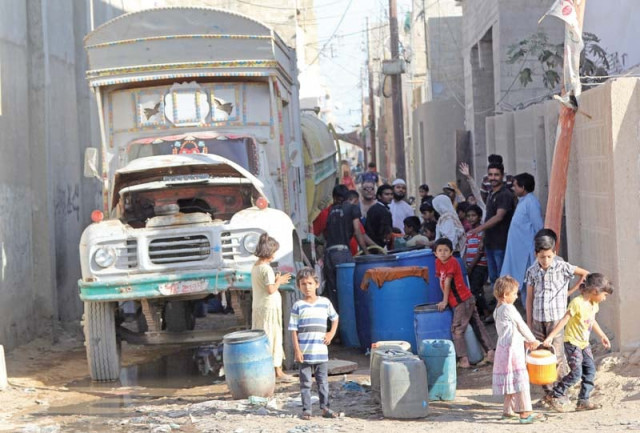Illegal hydrants case: KWSB ‘patronising’ water mafia, observes SC
Says city left at the mercy of valve-men, who have held it hostage

Families buy water from a tanker due to shortage of the essential commodity in Korangi. PHOTO: AYSHA SALEEM/EXPRESS
A three-judge bench, headed by Justice Amir Hani Muslim, also called for a report from the provincial government on efforts being made to resolve the issue of artificial water shortage in Karachi.
The bench, which also comprised justices Mushir Alam and Khilji Arif Hussain, was hearing the applications against operation of illegal hydrants in the city at SC's Karachi registry. The complainants said hydrants had taken illegal connections by damaging the KWSB's lines in different areas of the city.
At the outset of proceedings, the water board's managing director, Misbahuddin Farid, presented a report on action initiated against the illegal hydrants in the city. He maintained that all the illegally set-up water hydrants had been demolished, adding that now only 13 legal hydrants were supplying water to the residents in areas with no pipeline system.
Expressing concerns over the supply of the essential commodity by commercial tankers instead of via the water board's taps, a bench member, Justice Khijli Arif Hussain, remarked, "We grew up drinking tap water but now a poor man needs to buy mineral water." He added that today, the citizens are demanding clean water and access to basic necessities as they have been deprived of these amenities.
Justice Muslim noted that the system of water supply in the city had been destroyed and now the valve-men were supplying the essential commodity to areas as per their own wishes. "The city [has been] left at the mercy of the valve-men, who have held it hostage," he further remarked.
The bench also inquired from the KWSB MD about a system of water supply through which the essential commodity could be supplied to the city impartially. It expressed displeasure over failure of the relevant authorities to install the water meters and remarked that had such meters been installed, the problem of unfair supply would have been resolved by up to 80%. Farid informed that only 20 meters had been installed, while the other 121 could not be installed due to lack of funds.
The bench members noted that water shortage in the city was taking place due to mismanagement on part of the water board. They observed that the water board itself was patronising the tankers mafia, adding that the engineers and other staff members were also getting their share from it.
Farid replied that the city was receiving 550 million gallons of water on a daily basis, which was lesser than its requirements. Justice Muslim told the water utility's chief that it meant every resident should get 18 gallons of water every day.
Expressing serious concerns over the capability of the board's management to run its affairs, the judge asked the MD to outsource the system of water supply if they found it difficult to run it.
The judges also inquired about the number of water tankers in the city. Farid informed that 10,000 private tankers were supplying water in the city. Confronting the officer, the bench members questioned how 13 water hydrants could supply water to 10,000 tankers. There must be more hydrants still operating in city, they added.
The bench warned that it will get the MD's report verified through physical inspections by the district and sessions judges and that action will be taken if the report was found contrary to the factual position.
Farid claimed that the situation of water supply in the city had improved following removal of illegal water hydrants.
Justice Muslim remarked that the action had brought change to this extent that a water tanker, which was earlier sold at Rs1,000 was now being sold at Rs2,500.
The apex court asked the KWSB MD to submit complete details of pending cases in courts related to water hydrants. It also sought record of the statements given by the KWSB officials in the courts.
The bench further directed the provincial finance department authorities to resolve the issue of payment of outstanding dues to the contractors, who had supplied water to the camps set-up in Karachi for the people displaced by floods in 2010.
Farid was directed to hold consultation with the provincial government and present a report in one week. Meanwhile, the provincial law officer was asked to file a report on behalf of the provincial government on steps being taken to resolve the issue of water scarcity in Karachi.
Published in The Express Tribune, August 26th, 2016.

















COMMENTS
Comments are moderated and generally will be posted if they are on-topic and not abusive.
For more information, please see our Comments FAQ